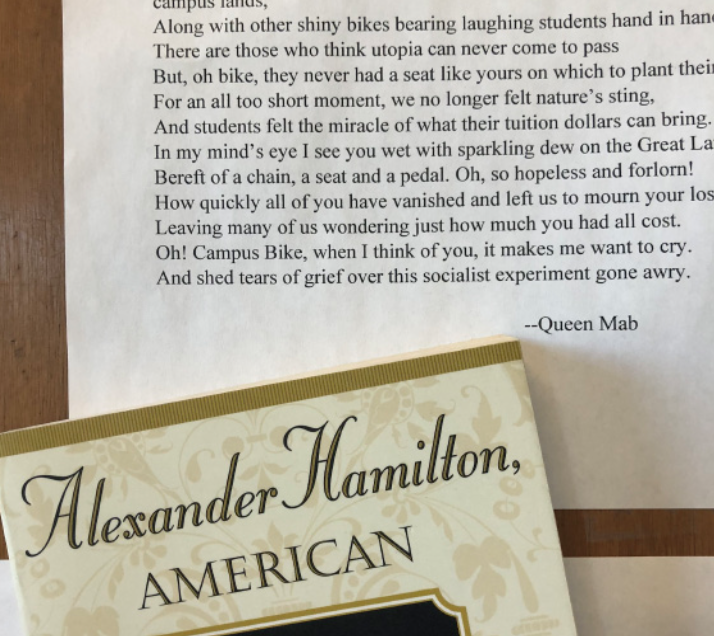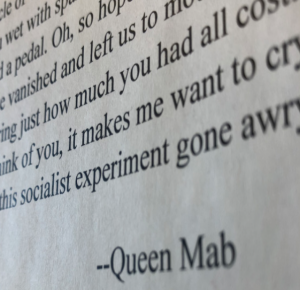By Paola Guzman
Copy Editor
Queen Mab, what’s the worst that can happen to you if you reveal your name? Will you lose your job? Lose your scholarship? Or face expulsion? According to the first amendment: nothing. Is this true?

Queen Mab, an anonymous poet, has been taping her poetry to doors and walls on campus. Her first poem, “Ode to a Campus Bike,” commented on the university’s costly efforts to provide 25 bikes for student use on campus shortly before Homecoming weekend. After a few weeks, the bikes were broken or missing, and Queen Mab wrote, “How quickly all of you [the bikes] have vanished and left us to mourn your loss/Leaving many of us wondering just how much you had all cost.”
She didn’t stop there. Queen Mab next wrote the poem, “Thirteen Ways of Looking at a Campus Bike,” which followed Wallace Stevens’ format for his poem, “Thirteen Ways of Looking at a Blackbird.” Then, she posted a new poem on a door in Humanities Hall almost immediately after LIU President Kimberly Cline’s announcement of an extra credit charge. “More Debt and the New Tuition Plan (with Apologies to Dr. Seuss)” followed Dr. Seuss’ format for “Green Eggs & Ham.”

Queen Mab, an anonymous poet on campus.
Although revolutionary at LIU, Queen Mab is not the first to use anonymity to express opposition to authority. Alexander Hamilton, James Madison and John Jay wrote “The Federalist Papers” anonymously, under the name Publius.
What would have happened to them if they revealed their names? Perhaps prison. But most probably: death.
Anonymity is a weapon used against those in power, who might cause harm to those who oppose them. Queen Mab uses this powerful tool to express her opinions on the university’s use of money, tuition, and services. Although many might wish for her to reveal her identity, if she does, grave consequences might follow.
Her right to freedom of speech should protect her, but what if it didn’t? This is why she chooses anonymity, a type of freedom of speech that is protected, and protects her.
Mary Pigliacelli, director of the writing center and an adjunct professor in the English department, said, “I really like the idea of poetry being used for a political statement because I think that’s one of the things poetry is good for. It’s a powerful vehicle for important issues.”
Alicia Miguel, sophomore nutrition major said, “She says everything we’re all thinking in the most beautiful and sarcastic way.”
Writers and anonymity have resulted in harmful situations to those who refuse to submit to authority. For example, Giardano Bruna wrote many things in contradiction with the church. He was later imprisoned and burned at the stake. Journalist, Judith Miller refused to provide the court with her anonymous source. In result, she was imprisoned.
Although these situations are extreme, Queen Mab is anonymous for a reason. Her writing is controversial and critical of the university. What is at stake for her?







Be First to Comment